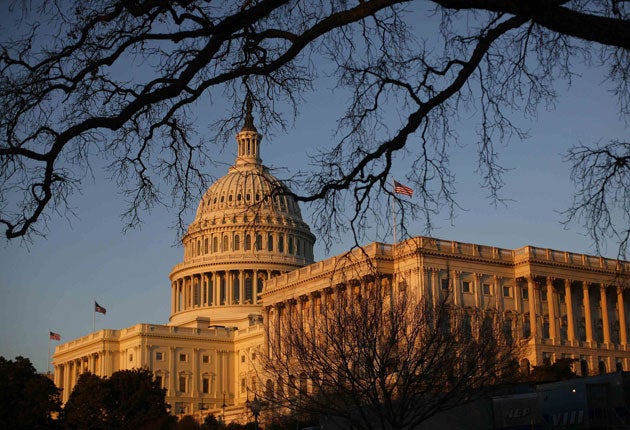Rupert Cornwell: Hard line is dictated by pro-Israel bias of Congress
On Capitol Hill positions on the Middle East are often more rigid than even those of the Netanyahu government

Your support helps us to tell the story
From reproductive rights to climate change to Big Tech, The Independent is on the ground when the story is developing. Whether it's investigating the financials of Elon Musk's pro-Trump PAC or producing our latest documentary, 'The A Word', which shines a light on the American women fighting for reproductive rights, we know how important it is to parse out the facts from the messaging.
At such a critical moment in US history, we need reporters on the ground. Your donation allows us to keep sending journalists to speak to both sides of the story.
The Independent is trusted by Americans across the entire political spectrum. And unlike many other quality news outlets, we choose not to lock Americans out of our reporting and analysis with paywalls. We believe quality journalism should be available to everyone, paid for by those who can afford it.
Your support makes all the difference.The blocking of almost $200m of American aid to the Palestinians due under the 2010-11 budget could be only a taste of further such action by the fiercely pro-Israel Congress, as it seeks wider spending cuts to reduce colossal future US fiscal deficits – and to "punish" the Palestinians for their push for statehood at the United Nations.
According to the dove-ish Americans for Peace Now group, Congress has also quietly halted $150m of security funding for the Palestinian Authority. But the real focus is on US assistance of some $600m due in the new fiscal year from 1 October, at a moment when the US international spending budget is under pressure.
The 2011-12 budget sent to Capitol Hill by the Obama administration requests an overall $59bn for the State Department and foreign aid spending. But this is certain to be reduced steeply. The Republican-controlled House Appropriations Committee is proposing a 20 per cent cut, while its counterpart in the Senate, where Democrats have a majority, has slashed the request to $53bn.
And the heavy pro-Israeli tilt of Congress is clear from the fine print of the separate budget proposals. In the House version, all aid to Palestine would be halted if President Mahmoud Abbas, who launched the statehood bid last month, succeeds in winning recognition from the world body.
The administration's request of more than $3bn for Israel, the largest single recipient of US foreign aid, has survived intact in both House and Senate drafts, even though every other category of aid spending would be reduced.
Separately, a measure sponsored by Ileana Ros-Lehtinen, Republican chairwoman of the House Foreign Affairs Committee, is taking aim at US contributions to Palestinian-related programmes at the UN, whose perceived anti-Israel bias have made them especially unpopular among many Congressional Republicans.
But support of the Jewish state is omnipresent on Capitol Hill, where positions on the Middle East conflict are often more uncompromising even than those of the Netanyahu government. That has been the case over halting aid to the Palestinian Authority – which many Israeli officials fear would only fan Palestinian unrest at a moment when the entire region is in turmoil.
If anything that support has grown, with the Republican takeover of the House and the increasing influence of evangelical Christians in the party's ranks. Meanwhile, the political risks of alienating the Jewish community were underlined last month when Republicans captured a heavily Jewish and traditionally Democratic congressional district in New York in an election where resentment of President Obama's perceived "tough" policies on Israel was a significant factor.
Join our commenting forum
Join thought-provoking conversations, follow other Independent readers and see their replies
Comments